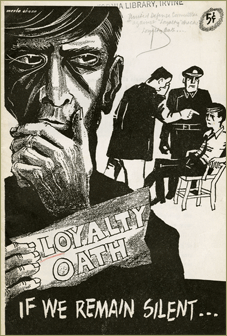McCarthyism during the Cold War
The Cold War era in the 1940s and 1950s was perhaps the most repressive time in American history with regard to civil liberties. In an aggressive effort to uncover espionage and subversion and fight the perceived threat of global communism, the U.S. government initiated a variety of programs which led to a climate of fear.
At the heart of the repressive atmosphere was the anti-communist House Un-American Activities Committee (1945-1975) led by Senator Joseph McCarthy. An investigatory committee of the U.S. House of Representatives, HUAC was formed to investigate threats of subversion or propaganda that attacked “the form of government guaranteed by our constitution.” It came into its own investigating suspicions that people with Communist ties or sympathies worked for the federal government. Loyalty oaths evolved as a key tool to test Communist affiliations. During both the Truman and Eisenhower administrations, through a number of Presidential Executive Orders, the government conducted loyalty investigations of federal government employees. The loyalty program stifled meaningful debate and discouraged many Americans from thinking, reading, or acting in any way that was outside the norm.
The McCarran Act required registration by Communist Party members and prevented them from traveling abroad. HUAC aggressively investigated private individuals whom it felt “either openly associate and assist disloyal groups or covertly operate as members or fellow travelers of such organizations.” For several years a wide variety of people were subjected to cruel public interrogations, including Hollywood celebrities and Army officials. As McCarthy became increasingly abusive in his threats and investigations, however, the tide of public opinion turned against him, and the hysteria of the era finally subsided in 1954 after broadcast journalist Edward R. Murrow aired a highly critical documentary questioning McCarthy’s methods.
The American voices in the items on exhibit represent a broad range of perspectives. Members of committees and organizations formed to fight both the HUAC investigations and various laws limiting political activities, including African Americans, represent dissent from the left. From the political right, we hear from those who saw a real threat to American values and traditions and expressed their concerns about Communist infiltration of our institutions.



